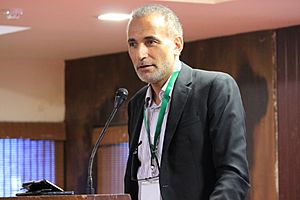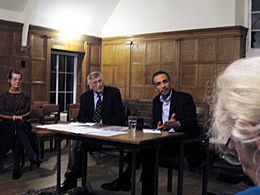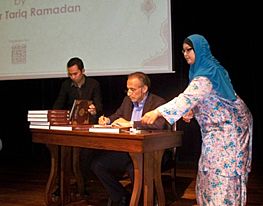Tariq Ramadan facts for kids
Quick facts for kids
Tariq Ramadan
|
|
|---|---|

Ramadan in December 2017
|
|
| Born | 26 August 1962 Geneva, Switzerland
|
| Nationality | Swiss |
| Alma mater | University of Geneva (PhD) |
| Era | 21st-century philosophy |
| Institutions | Collège de Saussure St Antony's College, Oxford |
|
Main interests
|
Islamic studies Theology philosophy Politics Interfaith dialogue Literature Reform |
|
Influences
|
|
Tariq Ramadan (Arabic: طارق رمضان, [tˤaːriq ramadˤaːn]; born 26 August 1962) is a Swiss Muslim academic, philosopher, and writer. He was a professor of contemporary Islamic studies at St Antony's College, Oxford and the Faculty of Theology and Religion, University of Oxford, but since 2018 has been taking an agreed leave of absence due to being held in prison following two ... allegations. He is a senior research fellow at Doshisha University in Japan, and is also a visiting professor at the Université Mundiapolis in Morocco. He was a visiting professor at the Faculty of Islamic Studies at Hamad Bin Khalifa University in Qatar, and used to be the director of the Research Centre of Islamic Legislation and Ethics (CILE), based in Doha. He is a member of the UK Foreign Office Advisory Group on Freedom of Religion or Belief. He was listed by Time magazine in 2000 as one of the seven religious innovators of the 21st century and in 2004 as one of the 100 most influential people in the world and was voted by Foreign Policy readers (2005, 2006, 2008–2010, 2012–2015) as one of the top 100 most influential thinkers in the world and Global Thinkers. Ramadan describes himself as a "Salafi reformist".
..... The university's statement noted that an "agreed leave of absence implies no acceptance or presumption of guilt". ..... The charges have not come to a full conclusion yet, but he was acquitted of one charge in May 2023. .....
Contents
Life and career

Tariq Ramadan was born in Geneva, Switzerland on 26 August 1962 to an Egyptian Muslim family. He is the son of Said Ramadan and Wafa al-Banna, who was the eldest daughter of Hassan al Banna, who in 1928 founded the Muslim Brotherhood in Egypt. Gamal al-Banna, the liberal Muslim reformer, was his great-uncle. His father was a prominent figure in the Muslim Brotherhood and was exiled by Gamal Abdel Nasser from Egypt to Switzerland, where Ramadan was born.
Tariq Ramadan holds an M.A. in French literature and a Ph.D. in Arabic and Islamic studies at the University of Geneva. He also wrote a Ph.D. dissertation on Friedrich Nietzsche, titled Nietzsche as a Historian of Philosophy.
In 1994, he addressed a French-speaking public audience, in Switzerland, with the help of Hassan Iquioussen and Malika Dif.
He taught at the Collège de Saussure, a high school in Lancy, Switzerland, and claims to have held a lectureship in Religion and Philosophy at the University of Fribourg from 1996 to 2003, something the university publicly denied in 2018. He was appointed a professor at the University of Notre Dame in the United States in 2004 before his visa had been revoked by the Bush administration because of the Patriot Act. In October 2005 he began teaching at St Antony's College, Oxford, on a visiting fellowship. In 2005 he was a senior research fellow at the Lokahi Foundation.
In 2007 he successfully applied for the professorship in Islamic studies at the University of Leiden. This led to severe criticism from both academics as well as politicians who deemed Ramadan a 'radical Islamist' and a 'wolf in sheep's clothing'. Ramadan later turned down the appointment, stating that the criticism on his appointment played no role in this decision. He was also a guest professor of Identity and Citizenship at Erasmus University Rotterdam, until August 2009 when both the City of Rotterdam and Erasmus University dismissed him from his positions as "integration adviser" and professor, stating that the program he hosted on Iran's Press TV, Islam & Life, was "irreconcilable" with his duties in Rotterdam. Ramadan described this move as 'Islamophobic' and 'politically charged'. In 2012 the Court of Rotterdam District ruled in a civil law case that the Erasmus University acted "carelessly" by dismissing Ramadan at short notice. The dismissal by the municipality of Rotterdam, however, was not careless according to the Court.
Beginning September 2009, Ramadan was appointed to the chair in Contemporary Islamic Studies at Oxford University.
Ramadan established the Mouvement des Musulmans Suisses (Movement of Swiss Muslims), which engages in various interfaith seminars. He is an advisor to the EU on religious issues and was sought for advice by the EU on a commission on "Islam and Secularism". In September 2005 he was invited to join a task force by the government of the United Kingdom. He is also the founder and President of the European Muslim Network, a Brussels-based think-tank that gathers European Muslim intellectuals and activists.
As of 2009, Tariq Ramadan was persona non grata in Tunisia, Egypt, Saudi Arabia, Libya, and Syria, which he has said is because of his criticism of their "undemocratic regimes". He is also considered persona non grata in Israel.
Family life
Tariq Ramadan married in 1986 and is the father of four children. His wife was born in Bretagne, France. She converted from Catholicism to Islam and adopted the name Iman. The couple live separately.
U.S. visa revocation and subsequent lifting
In February 2004, Tariq Ramadan accepted the tenured position of Henry R. Luce Professor of Religion, Conflict and Peacebuilding at the Joan B. Kroc Institute for International Peace Studies, at the University of Notre Dame. He was granted a nonimmigrant visa on 5 May; however, on 28 July, his H-1B visa was revoked by the State Department. In August 2004, spokesman for U.S. Immigration and Customs Enforcement cited the "ideological exclusion provision" of the U.S. Patriot Act as the grounds for Ramadan's visa revocation. In October, the University of Notre Dame filed an H-1B petition on Ramadan's behalf. After hearing no response from the government by December, Ramadan resigned his position from the university.
In September 2005, Ramadan filed an application for a B Visa to allow him to participate at speaking arrangements with various organizations and universities. The government did not issue a decision on Ramadan's visa application, so the American Civil Liberties Union and the New York Civil Liberties Union filed a lawsuit on 25 January 2006 against the United States government on behalf of the American Academy of Religion, the American Association of University Professors and the PEN American Center – three groups who had planned on meeting with Ramadan in the US – for revoking Ramadan's visa under the "ideological exclusion provision". The ACLU and NYCLU argued that the ideological exclusion provision was in violation of the First Amendment and Fifth Amendment rights of those three groups and that the government's actions violated the Administrative Procedures Act. After two months had passed without a decision being made, the plaintiffs filed a motion for a preliminary injunction. Pursuant to the injunction, the United States District Court for the Southern District of New York ordered the government on 23 June 2006 to issue its decision on Ramadan's pending B Visa application within 90 days.
On 19 September 2006, the government formally denied Ramadan's visa application. A State Department statement said: "A U.S. consular officer has denied Dr. Tariq Ramadan's visa application. The consular officer concluded that Dr. Ramadan was inadmissible based solely on his actions, which constituted providing material support to a terrorist organization." Between December 1998 and July 2002, Ramadan had given donations totalling $940 to two charity organizations, the Committee for Charity and Support for the Palestinians (CBSP) or Comité de Bienfaisance et de Secours aux Palestiniens and the Association de Secours Palestinien. The United States Treasury designated both the CBSP and ASP terrorist fundraising organizations for their alleged links to Hamas on 22 August 2003. The U.S. Embassy told Ramadan that he "reasonably should have known" that the charities provided money to Hamas. In an article in The Washington Post, Ramadan asked: "How should I reasonably have known of their activities before the U.S. government itself knew?"
On 2 February 2007, the ACLU and NYCLU amended their complaint, arguing that the government's explanation for denying Ramadan's visa application was not "facially legitimate and bona fide" and that the ideological exclusion provision of the PATRIOT Act was in violation of the First and Fifth Amendments. They also argued that Ramadan's denial violated the First Amendment rights of those who wanted to hear him speak. In his decision on 20 December 2007, District Judge Paul A. Crotty ruled that the government's justification for denying Ramadan's visa was "facially legitimate and bona fide" and noted that the Court "has no authority to override the Government's consular decision".
In January 2008, the ACLU appealed Crotty's ruling.
On 17 July 2009, the US federal appeals court reversed the ruling of the lower district court. The three-judge panel on the United States Court of Appeals for the Second Circuit – composed of Judges Jon O. Newman, Wilfred Feinberg and Reena Raggi – ruled that the Court had "jurisdiction to consider the claim, despite the doctrine of consular nonreviewability". They stated that government was required by law to "confront Ramadan with the allegation against him and afford him the subsequent opportunity to demonstrate by clear and convincing evidence that he did not know, and reasonably should not have known, that the recipient of his contributions was a terrorist organization." Under the limited review permitted by the 1972 Supreme Court ruling in Kleindienst v. Mandel, the panel concluded that the "record does not establish that the consular officer who denied the visa confronted Ramadan with the allegation that he had knowingly rendered material support to a terrorist organization, thereby precluding an adequate opportunity for Ramadan to attempt to satisfy the provision that exempts a visa applicant from exclusion under the 'material support' subsection if he 'can demonstrate by clear and convincing evidence that [he] did not know, and should not reasonably have known, that the organization was a terrorist organization.'" Additionally, the panel agreed with the plaintiffs' contention that their First Amendment rights had been violated. The panel remanded the case to a lower court to determine if the consular officer had confronted Ramadan with the "allegation that he knew that ASP provided funds to Hamas and then providing him with a reasonable opportunity to demonstrate, by clear and convincing evidence, that he did not know, and should not have reasonably known, of that fact."
Following the ruling, Ramadan stated, "I am very gratified with the court's decision. I am eager to engage once again with Americans in the kinds of face-to-face discussions that are central to academic exchange and crucial to bridging cultural divides." Melissa Goodman, staff attorney with the ACLU National Security Project, issued a statement saying, "Given today's decision, we hope that the Obama administration will immediately end Professor Ramadan's exclusion. We also encourage the new administration to reconsider the exclusion of other foreign scholars, writers and artists who were barred from the country by the Bush administration on ideological grounds."
On 8 April 2010, Ramadan spoke as part of a panel discussion at the Great Hall of Cooper Union in New York City, his first public appearance since the State Department lifted the ban. The group debated the lengths to which Western nations should go to accommodate their Muslim populations.
Views
Ramadan works primarily on Islamic theology and the position of Muslims in the West and within Muslim majority countries. Generally speaking, he prioritizes Qur'anic interpretation over simply reading the text, in order to understand its meaning and to practice the tenets of Islamic philosophy. Referring to himself, Ramadan has at times used the construction "Salafi Reformist" to illustrate his stance.
He rejects a binary division of the world into dar al-Islam (the abode of Islam) and dar al-harb (the abode of war), on the grounds that such a division is not mentioned in the Qur'an. He has been also known to cite favourably the dar al-da‘wah (abode of preaching).
For him the "Islamic message" to which Muslims are expected to bear witness is not primarily the particularist, socially conservative code of traditionalist jurists, but a commitment to universalism and the welfare of non-Muslims; it is also an injunction not merely to make demands on un-Islamic societies but to express solidarity with them.
Ramadan has voiced his opposition to all forms of capital punishment but believes the Muslim world should remove such laws from within, without any Western pressure, as such would only further alienate Muslims, and instead bolster the position of those who support hudud punishments: "Muslim populations are convincing themselves of the Islamic character of these practices through a rejection of the west, on the basis of a simplistic reasoning that stipulates that 'the less western, the more Islamic'".
..... Additionally, he contends that terrorism is never justifiable, even though it can be understandable (in the sense of having a legitimate cause of resistance behind it).
Ramadan wrote that the Muslim response to Pope Benedict XVI's speech on Islam was disproportionate, and was encouraged by reactionary Islamic regimes in order to distract their populations, and that it did not improve the position of Islam in the world.
Ramadan wrote an article, "Critique des (nouveaux) intellectuels communautaires", which French newspapers Le Monde and Le Figaro refused to publish. Oumma.com did eventually publish it. In the article he criticizes a number of French intellectuals and figures such as Alexandre Adler, Alain Finkielkraut, Bernard-Henri Lévy, André Glucksmann and Bernard Kouchner, for allegedly abandoning universal human rights, and giving special status to the defence of Israel. Ramadan was accused, in return, of having used inflammatory language. The underlying content of the essay was sharply criticized as well.
Debate
..... Ramadan replied that Sarkozy was wrong. He said that he opposed corporal punishments, stoning and the death penalty and that he is in favor of a moratorium on these practices to open the debate among Islamic scholars in Muslim-majority countries that enforce them. Many people, including Sarkozy, were outraged. Ramadan later defended his position arguing that, because it involved religious texts that Muslims take seriously, the law would have to be properly understood and contextualized. Ramadan argued that in Muslim countries, the simple act to "condemn" won't change anything, but with a moratorium, it could open the way for further debate. He thinks that such a debate can only lead to an abolition of these rules.
In October 2007, Warraq participated in an Intelligence Squared debate "We Should Not Be Reluctant to Assert the Superiority of Western Values," where he argued for the opposition viewpoint, together with William Dalrymple, and Charles Glass.
Mauritania ban
On 16 July 2016, Ramadan was denied entry to Mauritania at Nouakchott International Airport. He had been invited to give lectures in the country. He claimed the decision "came directly from the presidency". Local police confirmed he "was expelled". This is the eighth time a Muslim country has denied him entry.
Awards and nominations
In January 2014, Ramadan was nominated for the title of Religious Advocate of the Year at the British Muslim Awards.
See also
 In Spanish: Tariq Ramadan para niños
In Spanish: Tariq Ramadan para niños


